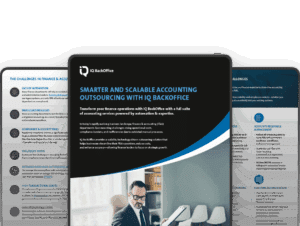Introduction
The financial landscape has fundamentally transformed. In an era defined by economic volatility, regulatory scrutiny, and accelerating digital innovation, CFOs stand at the helm of organizations navigating increasingly complex waters. The stakes have never been higher—or the opportunities greater.
For decades, the robust in-house accounting department represented the gold standard of financial operations. But, today, that model is showing significant strain. Finance leaders are witnessing how talent scarcity and escalating personnel costs create operational vulnerabilities, precisely when financial leadership is most critical.
The numbers tell a compelling story. According to the 2024 Finance and Accounting Talent Market Outlook report, 83% of senior leaders reported significant talent gaps, a notable increase from 63% in just four years. The report also revealed that 90% of CFOs outsource at least some accounting function amid this intensifying talent crisis.
From Cost-Cutting to Strategic Advantage
The rapid adoption of accounting outsourcing solutions reflects a fundamental shift in perspective. Market projections from Grand View Research indicate the global finance and accounting business process outsourcing market will reach USD 110 billion by 2030, growing at a compound annual growth rate of 9.3% from 2025 to 2030. This growth trajectory underscores how business leaders increasingly recognize that accounting outsourcing delivers substantial strategic value beyond mere cost reduction.
Today’s CFOs leverage accounting outsourcing to accelerate reporting cycles, strengthen compliance frameworks, and improve financial data reliability while simultaneously liberating internal teams from transactional activities. This reallocation of resources enables finance professionals to focus on higher-value strategic initiatives—developing actionable business insights, supporting expansion opportunities, and collaborating more effectively with operational leaders across the enterprise, ultimately positioning their organizations for sustainable competitive advantage in increasingly complex business environments.
Key Benefits Beyond Cost Reduction
Improved Compliance
Outsourcing providers offer specialized expertise in navigating complex regulatory landscapes. They ensure compliance with evolving tax laws, accounting standards, and industry-specific regulations, mitigating the risk of penalties and reputational damage. As PwC notes, outsourcing provides access to specialized skills and resources that may not be available internally, helping organizations maintain compliance with complex regulations.
This expertise becomes increasingly valuable as regulatory environments grow more complex. With financial reporting requirements evolving globally, organizations operating across multiple jurisdictions face significant challenges. Outsourcing partners with dedicated compliance teams provide invaluable support in navigating these complexities.
Access to Cutting-Edge Technology
The technology landscape for financial operations continues to advance rapidly. Artificial intelligence, machine learning, and robotic process automation are transforming traditional accounting processes—but many organizations struggle to keep pace on their own. In-house automation efforts can quickly become costly missteps when teams lack the specialized expertise to fully implement or maintain the tools, often leading to negative ROI.
Outsourcing partnerships offer a more strategic path to technological advancement—without the need for substantial capital investments or deep technical know-how. Providers like IQ BackOffice invest in the latest software and automation technologies, giving clients access to cutting-edge tools that would otherwise be expensive and complex to deploy internally.
Scalability and Flexibility
Outsourcing allows businesses to scale accounting resources up or down as needed, providing flexibility to adapt to changing business conditions and growth trajectories.
The ability to access specialized expertise on demand creates significant operational advantages. Organizations can supplement their capabilities during complex transactions, system implementations, or regulatory changes without maintaining permanent staff for these periodic needs.
Enhanced Efficiency and Focus
By entrusting routine accounting tasks to external experts, in-house teams can focus on higher-value activities such as strategic planning, financial analysis, and decision support. This allows CFOs to allocate internal resources more effectively.
The reorientation of focus represents perhaps the most transformative aspect of modern outsourcing relationships. When freed from transactional processing and routine compliance activities, finance professionals can develop deeper business partnerships across the organization, driving performance improvements and supporting strategic initiatives.
Common Misconceptions, Addressed
Despite the growing recognition of its benefits, some misconceptions still hold companies back from embracing accounting outsourcing:
Misconception #1: Loss of Control
Many executives fear outsourcing accounting functions will reduce visibility and control over financial processes. In practice, modern outsourcing relationships typically provide greater transparency through purpose-built reporting tools and regular performance metrics.
Misconception #2: Security Concerns
Data security remains a legitimate concern for any financial arrangement. However, reputable outsourcing providers typically maintain security protocols exceeding those of their clients’ in-house capabilities.
Misconception #3: Lack of Personalization
Some believe outsourcing leads to a generic approach. However, reputable providers tailor their services to meet the specific needs and requirements of each client, ensuring a personalized and effective solution.
Building the Right Partnership
Successful outsourced accounting relationships depend on thoughtful selection and implementation. Finance leaders should consider:
- Strategic alignment: Ensuring the provider understands your industry, growth objectives, and strategic priorities.
- Technology compatibility: Evaluating the provider’s technological capabilities and integration approach.
- Cultural fit: Assessing communication styles and working methods.
- Governance structure: Establishing clear performance metrics, communication protocols, and escalation procedures.
Conclusion
As financial leaders navigate talent shortages, technology transformation, and growing compliance demands, outsourced accounting has evolved from a tactical cost-saving measure to a strategic advantage. By leveraging specialized expertise, improved technology, and scalable resources, CFOs can redirect internal focus toward strategic initiatives while maintaining robust financial operations.
The question for forward-looking finance leaders is no longer whether accounting outsourcing belongs in their operational toolkit, but rather how to implement it most effectively to address their specific challenges and support long-term business objectives.
Don’t let talent shortages and operational inefficiencies hold your organization back. Contact us today to learn how we can help enhance your financial capabilities while reducing costs.












